Richard Francis Burton
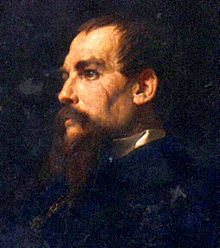
He noblest lives and noblest dies who makes and keeps his self-made laws.
Sir Richard Francis Burton (19 March 1821 – 20 October 1890) was a British consul, explorer, translator, writer, poet, Orientalist and swordsman known for his often-unprecedented exploits of travel and exploration as well as his extraordinary knowledge of languages and cultures.
Quotes
[edit]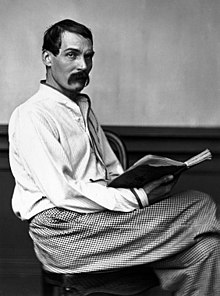



- Now the last hookah has gone out, and the most restless of our servants has turned in. The roof of the cabin is strewed with bodies anything but fragrant, indeed, we cannot help pitying the melancholy fate of poor Morpheus, who is traditionally supposed to encircle such sleepers with his soft arms. Could you believe it possible that through such a night as this they choose to sleep under those wadded cotton coverlets, and dread not instantaneous asphixiation?
- Goa, and The Blue Mountains; or, Six Months of Sick Leave (1851)
- Is not man born with a love of change — an Englishman to be discontented — an Anglo-Indian to grumble?
- Goa, and The Blue Mountains; or, Six Months of Sick Leave (1851)
- Travellers like poets are mostly an angry race.
- "Narrative of a Trip to Harar" (11 June 1855); published in The Journal of the Royal Geographical Society (June 1855)
- Presently our fire being exhausted, and the enemy pressing on with spear and javelin, the position became untenable; the tent was nearly battered down by clubs, and had we been entangled in its folds, we should have been killed without the power of resistance. I gave the word for a rush, and sallied out with my sabre, closely followed by Lieut. Herne, with Lieut. Speke in the rear. The former was allowed to pass through the enemy with no severer injury than a few hard blows with a war club. The latter was thrown down by a stone hurled at his chest and taken prisoner, a circumstance which we did not learn till afterwards. On leaving the tent I thought that I perceived the figure of the late Lieut. Stroyan lying upon the ground close to the camels. I was surrounded at the time by about a dozen of the enemy, whose clubs rattled upon me without mercy, and the strokes of my sabre were rendered uncertain by the energetic pushes of an attendant who thus hoped to save me. The blade was raised to cut him down: he cried out in dismay, and at that moment a Somali stepped forward, threw his spear so as to pierce my face, and retired before he could be punished. I then fell back for assistance, and the enemy feared pursuing us into the darkness. Many of our Somalis and servants were lurking about 100 yards from the fray, but nothing would persuade them to advance. The loss of blood causing me to feel faint, I was obliged to lie down, and, as dawn approached, the craft from Aynterad was seen apparently making sail out of the harbour.
- A brief account of the attack that left him scarred from a spearhead that entered one side of his face and exited the other, in "Narrative of a Trip to Harar" (11 June 1855); published in The Journal of the Royal Geographical Society (June 1855)
- How melancholy a thing is success. Whilst failure inspirits a man, attainment reads the sad prosy lesson that all our glories "Are shadows, not substantial things." Truly said the sayer, "disappointment is the salt of life" a salutary bitter which strengthens the mind for fresh exertion, and gives a double value to the prize.
- First Footsteps in East Africa (1856)
- Of the gladest moments in human life, methinks is the departure upon a distant journey to unknown lands. Shaking off with one mighty effort the fetters of habit, the leaden weight of Routine, the cloak of many Cares and the Slavery of Home, man feels once more happy. The blood flows with the fast circulation of childhood....afresh dawns the morn of life...
- Journal Entry (2 December 1856)
- Support a compatriot against a native, however the former may blunder or plunder.
- Exploration of the Highlands of Brazil (1869)
- The recruit must be carefully and sedulously taught when meeting the enemy, even at a trot or canter, to use no force whatever, otherwise his sword will bury itself to the hilt, and the swordsman will either be dragged from his horse, or will be compelled to drop his weapon — if he can. Upon this point I may quote my own System of Bayonet Exercise (p. 27): —
"The instructor must spare no pains in preventing the soldier from using force, especially with the left or guiding arm, as too much exertion generally causes the thrust to miss. A trifling body-stab with the bayonet (I may add with the sword) is sufficient to disable a man; and many a promising young soldier has lost his life by burying his weapon so deep in the enemy's breast that it could not be withdrawn quickly enough to be used against a second assailant. To prevent this happening, the point must be delivered smartly, with but little exertion of force, more like a dart than a thrust, and instantly afterwards the bayonet must be smartly withdrawn." In fact the thrust should consist of two movements executed as nearly simultaneously as possible; and it requires long habit, as the natural man, especially the Englishman, is apt to push home, and to dwell upon his slouching push.- A New System of Sword Exercise for Infantry (1876)
- They walked the water's vasty breadth of blue,
parting the restless billows on their way.- Translation of The Lusiads (1880), Canto I, st. 19, p. 11
- Ah! where shall weary man take sanctuary,
where live his little span of life secure?
and 'scape of Heav'n serene th' indignant storms
that launch their thunders at us earthen worms?- Translation of The Lusiads, Canto I, st. 106, p. 40
- The dearest ambition of a slave is not liberty but to have a slave of his own.
- The Book of The Thousand Nights And A Night (1885) When it was the Three Hundred and Sixtieth Night, footnote
- The more I study religions the more I am convinced that man never worshipped anything but himself.
- The Book of The Thousand Nights And A Night (1885) Terminal Essay: Social Conditions, fn. 13.
- The England of our day would fain bring up both sexes and keep all ages in profound ignorance of sexual and intersexual relations; and the consequences of that imbecility are particularly cruel and afflicting. … Shall we ever understand that ignorance is not innocence?
- The Supplemental Nights (1888), quoted in The Life of Sir Richard Burton, Vol. II (1906), by Thomas Wright, p. 124
- I have struggled for forty-seven years, distinguishing myself honourably in every way that I possibly could. I never had a compliment, nor a "thank you," nor a single farthing. I translate a doubtful book in my old age, and I immediately make sixteen thousand guineas. Now that I know the tastes of England, we need never be without money.
- As quoted in The Life of Captain Sir Richd. F. Burton, Vol. II (1893), by Lady Isabel Burton, p. 442
- Conquer thyself, till thou hast done this, thou art but a slave; for it is almost as well to be subjected to another's appetite as to thine own.
- As quoted in The New Dictionary of Thoughts : A Cyclopedia of Quotations from the Best Authors of the World, Both Ancient and Modern, Alphabetically Arranged by Subjects (1957) by Tryon Edwards, p. 510
- Starting in a hollowed log of wood — some thousand miles up a river, with an infinitesimal prospect of returning! I ask myself 'Why?' and the only echo is 'damned fool!... the Devil drives'.
- Burton to Lord Houghton as quoted in The Devil Drives: A life of Sir Richard Burton (1984) by Fawn Brodie.
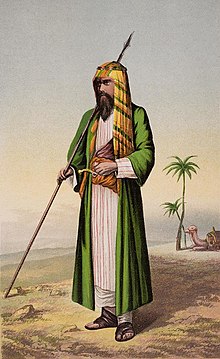

- "Hâjî Abdû El-Yezdî" was simply a pseudonym which Burton used as the author of this poem, originally crediting himself only as the "translator". Full text online at Project Gutenberg PDF and EPUB at Google (1880 edition)



But leave it vague as airy space, dark in its darkness mystical.
The Translator has ventured to entitle a "Lay of the Higher Law" the following composition, which aims at being in advance of its time; and he has not feared the danger of collision with such unpleasant forms as the "Higher Culture." The principles which justify the name are as follows: —
The Author asserts that Happiness and Misery are equally divided and distributed in the world.
He makes Self-cultivation, with due regard to others, the sole and sufficient object of human life.
He suggests that the affections, the sympathies, and the "divine gift of Pity" are man's highest enjoyments.
He advocates suspension of judgment, with a proper suspicion of "Facts, the idlest of superstitions."
Finally, although destructive to appearance, he is essentially reconstructive.
For other details concerning the Poem and the Poet, the curious reader is referred to the end of the volume.
- Preface (November 1880)
I
- Friends of my youth, a last adieu! haply some day we meet again;
Yet ne'er the self-same men shall meet; the years shall make us other men.
III
- Hardly we find the path of love, to sink the self, forget the "I,"
When sad suspicion grips the heart, when Man, the Man begins to die:
- How Thought is imp'otent to divine the secret which the gods defend,
The Why of birth and life and death, that Isis-veil no hand may rend.
Eternal Morrows make our day; our is is aye to be till when
Night closes in; 'tis all a dream, and yet we die, — and then and then?
And still the Weaver plies his loom, whose warp and woof is wretched Man
Weaving th' unpattern'd dark design, so dark we doubt it owns a plan.
- Cease, Man, to mourn, to weep, to wail; enjoy thy shining hour of sun;
We dance along Death's icy brink, but is the dance less full of fun?
IV
- There is no God, no man-made God; a bigger, stronger, crueller man;
Black phantom of our baby-fears, ere Thought, the life of Life, began.
- How shall the Shown pretend to ken aught of the Showman or the Show?
Why meanly bargain to believe, which only means thou ne'er canst know?
How may the passing Now contain the standing Now — Eternity? —
An endless is without a was, the be and never the to-be?
- Grant an Idea, Primal Cause, the Causing Cause, why crave for more?
Why strive its depth and breadth to mete, to trace its work, its aid to íimplore?
Unknown, Incomprehensible, whateíer you choose to call it, call;
But leave it vague as airy space, dark in its darkness mystical.
- Your childish fears would seek a Sire, by the non-human God defined,
What your five wits may wot ye weet; what is you please to dub "designíd;"
You bring down Heavíen to vulgar Earth; your maker like yourselves you make,
You quake to own a reign of Law, you pray the Law its laws to break;
You pray, but hath your thought e'er weighed how empty vain the prayer must be,
That begs a boon already giv'en, or craves a change of law to see?
- Man worships self: his God is Man; the struggling of the mortal mind
To form its model as 'twould be, the perfect of itself to find.
V
- What call ye them or Goods or Ills, ill-goods, good-ills, a loss, a gain,
When realms arise and falls a roof; a world is won, a man is slain?

VI
- All Faith is false, all Faith is true: Truth is the shattered mirror strown
In myriad bits; while each believes his little bit the whole to own.
- What is the Truth? was askt of yore. Reply all object Truth is one
As twain of halves aye makes a whole; the moral Truth for all is none.
- As palace mirror'd in the stream, as vapour mingled with the skies,
So weaves the brain of mortal man the tangled web of Truth and Lies.
- What see we here? Forms, nothing more! Forms fill the brightest, strongest eye,
We know not substance; 'mid the shades shadows ourselves we live and die.
"Faith mountains move" I hear: I see the practice of the world unheed
The foolish vaunt, the blatant boast that serves our vanity to feed."Faith stands unmoved"; and why? Because man's silly fancies still remain,
And will remain till wiser man the day-dreams of his youth disdain.
- "'Tis blessed to believe"; you say: The saying may be true enow
And it can add to Life a light: — only remains to show us how.
- With God's foreknowledge man's free will! what monster-growth of human brain,
What powers of light shall ever pierce this puzzle dense with words inane?
- "Be ye Good Boys, go seek for Heav'en, come pay the priest that holds the key;"
So spake, and speaks, and aye shall speak the last to enter Heaven, — he.
Yes Truth may be, but 'tis not Here; mankind must seek and find it There,
But Where nor I nor you can tell, nor aught earth-mother ever bare.Enough to think that Truth can be: come sit we where the roses glow,
Indeed he knows not how to know who knows not also how to 'unknow.'
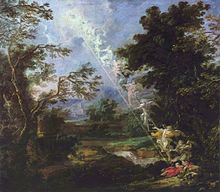
VII
Words, words that gender things! The soul is a new-comer on the scene;
Sufficeth not the breath of Life to work the matter-born machine?The race of Be'ing from dawn of Life in an unbroken course was run;
What men are pleased to call their Souls was in the hog and dog begun:Life is a ladder infinite-stepped, that hides its rungs from human eyes;
Planted its foot in chaos-gloom, its head soars high above the skies:No break the chain of Being bears; all things began in unity;
And lie the links in regular line though haply none the sequence see.

And lie the links in regular line though haply none the sequence see.
"Th' immortal mind of mortal man!" we hear yon loud-lunged Zealot cry;
Whose mind but means his sum of thought, an essence of atomic "I."Thought is the work of brain and nerve, in small-skulled idiot poor and mean;
In sickness sick, in sleep asleep, and dead when Death lets drop the scene.
- "Tush!" quoth the Zahid, "well we ken the teaching of the school abhorr'd
"That maketh man automaton, mind a secretion, soul a word.""Of molecules and protoplasm you matter-mongers prompt to prate;
"Of jelly-speck development and apes that grew to man's estate."Vain cavil! all that is hath come either by Mir'acle or by Law; —
Why waste on this your hate and fear, why waste on that your love and awe?
Is not the highest honour his who from the worst hath drawn the best;
May not your Maker make the world from matter, an it suit His hest?Nay more, the sordider the stuff the cunninger the workman's hand:
Cease, then, your own Almighty Power to bind, to bound, to understand.

"Reason and Instinct!" How we love to play with words that please our pride;
Our noble race's mean descent by false forged titles seek to hide!For "gift divine" I bid you read the better work of higher brain,
From Instinct diff'ering in degree as golden mine from leaden vein.
- Reason is Life's sole arbiter, the magic Laby'rinth's single clue:
Worlds lie above, beyond its ken; what crosses it can ne'er be true.
- "Fools rush where Angels fear to tread!" Angels and Fools have equal claim
To do what Nature bids them do, sans hope of praise, sans fear of blame!
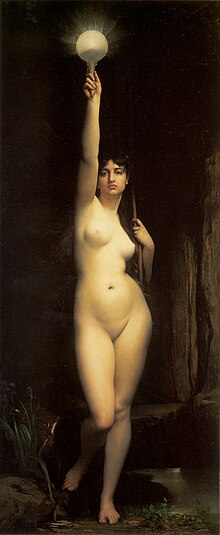
VIII
- There is no Heav'en, there is no Hell; these be the dreams of baby minds,
Tools of the wily Fetisheer, to 'fright the fools his cunning blinds.
Learn from the mighty Spi'rits of old to set thy foot on Heav'en and Hell;
In Life to find thy hell and heav'en as thou abuse or use it well.
- Hard to the heart is final death: fain would an Ens not end in Nil;
Love made the senti'ment kindly good: the Priest perverted all to ill.
While Reason sternly bids us die, Love longs for life beyond the grave:
Our hearts, affections, hopes and fears for Life-to-be shall ever crave.
Hence came the despot's darling dream, a Church to rule and sway the State;
Hence sprang the train of countless griefs in priestly sway and rule innate.
For future Life who dares reply? No witness at the bar have we;
Save what the brother Potsherd tells, — old tales and novel jugglery.
Who e'er return'd to teach the Truth, the things of Heaven and Hell to limn?
And all we hear is only fit for grandam-talk and nursery-hymn.
- "Who drinks one bowl hath scant delight; to poorest passion he was born;
"Who drains the score must e'er expect to rue the headache of the morn."
Safely he jogs along the way which "Golden Mean" the sages call;
Who scales the brow of frowning Alp must face full many a slip and fall.
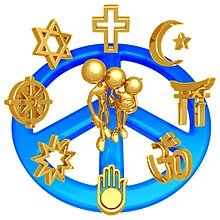
- When doctors differ who decides amid the milliard-headed throng?
Who save the madman dares to cry: "'Tis I am right, you all are wrong"?
"You all are right, you all are wrong," we hear the careless Soofi say,
"For each believes his glimm'ering lamp to be the gorgeous light of day."
"Thy faith why false, my faith why true? 'tis all the work of Thine and Mine,
"The fond and foolish love of self that makes the Mine excel the Thine."
Cease then to mumble rotten bones; and strive to clothe with flesh and blood
The skel'eton; and to shape a Form that all shall hail as fair and good.
- Do what thy manhood bids thee do, from none but self expect applause;
He noblest lives and noblest dies who makes and keeps his self-made laws.
All other Life is living Death, a world where none but Phantoms dwell,
A breath, a wind, a sound, a voice, a tinkling of the camel-bell.
IX
- From self-approval seek applause: What ken not men thou kennest, thou!
Spurn ev'ry idol others raise: Before thine own Ideal bow:
Be thine own Deus: Make self free, liberal as the circling air:
Thy Thought to thee an Empire be; break every prison'ing lock and bar.

- And hold Humanity one man, whose universal agony
Still strains and strives to gain the goal, where agonies shall cease to be.
Believe in all things; none believe; judge not nor warp by "Facts" the thought;
See clear, hear clear, tho' life may seem Mâyâ and Mirage, Dream and Naught.
Abjure the Why and seek the How: the God and gods enthroned on high,
Are silent all, are silent still; nor hear thy voice, nor deign reply.
The Now, that indivisible point which studs the length of infinite line
Whose ends are nowhere, is thine all, the puny all thou callest thine.
- Haply the Law that rules the world allows to man the widest range;
And haply Fate's a Theist-word, subject to human chance and change.
This "I" may find a future Life, a nobler copy of our own,
Where every riddle shall be ree'd, where every knowledge shall be known;
Where 'twill be man's to see the whole of what on Earth he sees in part;
Where change shall ne'er surcharge the thought; nor hope defer'd shall hurt the heart.
Note I : Hâjî Abdû, The Man
[edit]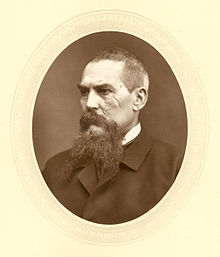




Lived in obedience to the inner law
Which cannot alter.
- Hâjî Abdû has been known to me for more years than I care to record. A native, it is believed, of Dârabghird in the Yezd Province, he always preferred to style himself El-Hichmakani, a facetious "lackab" or surname, meaning "Of No-hall, Nowhere." He had travelled far and wide with his eyes open; as appears by his "couplets."
- He looks with impartial eye upon the endless variety of systems, maintained with equal confidence and self-sufficiency, by men of equal ability and honesty. He is weary of wandering over the world, and of finding every petty race wedded to its own opinions; claiming the monopoly of Truth; holding all others to be in error, and raising disputes whose violence, acerbity and virulence are in inverse ratio to the importance of the disputed matter. A peculiarly active and acute observation taught him that many of these jarring families, especially those of the same blood, are par in the intellectual processes of perception and reflection; that in the business of the visible working world they are confessedly by no means superior to one another; whereas in abstruse matters of mere Faith, not admitting direct and sensual evidence, one in a hundred will claim to be right, and immodestly charge the other ninety-nine with being wrong.
Thus he seeks to discover a system which will prove them all right, and all wrong; which will reconcile their differences; will unite past creeds; will account for the present, and will anticipate the future with a continuous and uninterrupted development; this, too, by a process, not negative and distinctive, but, on the contrary, intensely positive and constructive. I am not called upon to sit in the seat of judgment; but I may say that it would be singular if the attempt succeeded. Such a system would be all-comprehensive, because not limited by space, time, or race; its principle would be extensive as Matter itself, and, consequently, eternal. Meanwhile he satisfies himself, — the main point.
- Christianity and Islamism have been on their trial for the last eighteen and twelve centuries. They have been ardent in proselytizing, yet they embrace only one-tenth and one-twentieth of the human race. Hâjî Abdû would account for the tardy and unsatisfactory progress of what their votaries call "pure truths," by the innate imperfections of the same. Both propose a reward for mere belief, and a penalty for simple unbelief; rewards and punishments being, by the way, very disproportionate. Thus they reduce everything to the scale of a somewhat unrefined egotism; and their demoralizing effects become clearer to every progressive age.
- The Hâjî regrets the excessive importance attached to a possible future state: he looks upon this as a psychical stimulant, a day dream, whose revulsion and reaction disorder waking life. The condition may appear humble and prosaic to those exalted by the fumes of Fancy, by a spiritual dram-drinking which, like the physical, is the pursuit of an ideal happiness. But he is too wise to affirm or to deny the existence of another world. For life beyond the grave there is no consensus of mankind… Even the instinctive sense of our kind is here dumb. We may believe what we are taught: we can know nothing. He would, therefore, cultivate that receptive mood which, marching under the shadow of mighty events, leads to the highest of goals, — the development of Humanity. With him suspension of judgment is a system.
- The "Schedule of Doctrines" of the most liberal Christian Church insists upon human depravity, and the "absolute need of the Holy Spirit's agency in man's regeneration and sanctification."
But what have we here? The "original calamity" was either caused by God or arose without leave of God, in either case degrading God to man. It is the old dilemma whose horns are the irreconcilable attributes of goodness and omniscience in the supposed Creator of sin and suffering. If the one quality be predicable, the other cannot be predicable of the same subject. Far better and wiser is the essayist's poetical explanation now apparently despised because it was the fashionable doctrine of the sage bard's day:—
- All nature is but art
- All discord harmony not understood;
- All partial evil universal good.—(Essay 289—292.)
- Burton here quotes Alexander Pope's An Essay on Man (1734)
- The Pilgrim holds with St. Augustine Absolute Evil is impossible because it is always rising up into good. He considers the theory of a beneficent or maleficent deity a purely sentimental fancy, contradicted by human reason and the aspect of the world.
- I am an individual … a circle touching and intersecting my neighbours at certain points, but nowhere corresponding, nowhere blending. Physically I am not identical in all points with other men. Morally I differ from them: in nothing do the approaches of knowledge, my five organs of sense (with their Shelleyan "interpenetration"), exactly resemble those of any other being. Ergo, the effect of the world, of life, of natural objects, will not in my case be the same as with the beings most resembling me. Thus I claim the right of creating or modifying for my own and private use, the system which most imports me; and if the reasonable leave be refused to me, I take it without leave.
But my individuality, however all-sufficient for myself, is an infinitesimal point, an atom subject in all things to the Law of Storms called Life. I feel, I know that Fate is. But I cannot know what is or what is not fated to befall me. Therefore in the pursuit of perfection as an individual lies my highest, and indeed my only duty, the "I" being duly blended with the "We." I object to be a "self-less man," which to me denotes an inverted moral sense. I am bound to take careful thought concerning the consequences of every word and deed. When, however, the Future has become the Past, it would be the merest vanity for me to grieve or to repent over that which was decreed by universal Law.
- That creatures endowed with the mere possibility of liberty should not always choose the Good appears natural. But that of the milliards of human beings who have inhabited Earth, not one should have been found invariably to choose Good, proves how insufficient is the solution. Hence no one believes in the existence of the complete man under the present state of things. The Haji rejects all popular and mythical explanation by the Fall of "Adam," the innate depravity of human nature, and the absolute perfection of certain Incarnations, which argues their divinity. He can only wail over the prevalence of evil, assume its foundation to be error, and purpose to abate it by uprooting that Ignorance which bears and feeds it.
His "eschatology," like that of the Soofis generally, is vague and shadowy.
- With Hâjî Abdû the soul is not material, for that would be a contradiction of terms. He regards it, with many moderns, as a state of things, not a thing; a convenient word denoting the sense of personality, of individual identity.
- The Pilgrim's sole consolation is in self-cultivation, and in the pleasures of the affections. This sympathy may be an indirect self-love, a reflection of the light of egotism: still it is so transferred as to imply a different system of convictions. It requires a different name: to call benevolence "self-love " is to make the fruit or flower not only depend upon a root for development (which is true), but the very root itself (which is false). And, finally, his ideal is of the highest: his praise is reserved for:
Misattributed
[edit]- A man that hoards up riches and enjoys them not, is like an ass that carries gold and eats thistles.
- 17th century proverb
- So much to learn!
Old Nature's ways
Of glee and gloom with rapt amaze
To study, probe, and paint – brown earth,
Salt sea, blue heavens, their tilth and dearth,
Birds, grasses, trees – the natural things
That throb or grope or poise on wings.- Richard Eugene Burton, Memorial Day, And Other Poems (1897), 'So Much to Learn', p. 8
Quotes about Burton
[edit]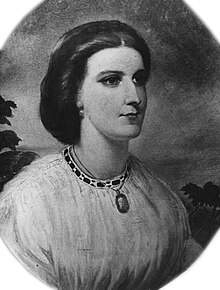




- Richard's idea was that every man, by doing all the good he could in this life, always working for others, for the human race, always acting "Excelsior," should leave a track of light behind him on this World as he passes through. His idea of God was so immeasurably grander than anything people are usually taught to think about God. It always seemed to him that we dwindled God down to our own mean imaginations; that we made something like ourselves, only bigger, and far crueller. There is some truth in this; we are always talking about God just as if we understood Him. His idea of a Divine Being was so infinite, so great, that to pray to Him was an impertinence; that it was monstrous that we should expect Him to alter one of His decrees, because we prayed for it; that He was a God of big universal love, but so far off, as to be far above anything we can understand.
- Isabel Burton, in The Life of Captain Sir Richd. F. Burton (1893), p. 196
- He was, as has been well said, an Elizabethan born out of time; in the days of Drake his very faults might have counted to his credit.
- Encyclopædia Britannica, 11th edition
- It was not his nature to give up until all his strength had been expended.
- Philip José Farmer, describing Burton's character in To Your Scattered Bodies Go (1971); Burton was one of the primary resurrected heroes in Farmer's Riverworld series.
- There seems little doubt that Burton was trying to project Sufi teaching in the West... In Sufism he finds a system of application to misguided faiths "which will prove them all right, and all wrong; which will reconcile their differences; will unite past creeds; will account for the present and will anticipate the future with a continuous and uninterrupted development."
- Idries Shah, in The Sufis (1964)
- Burton's strain of Romany accounted for his vagabond tendencies, intolerant of all convention or restraint, which procured him the sobriquet of "Ruffian Dick" at Oxford and in his early days in India. Before middle age he had, as Lord Derby, said, "compressed into his life more of study, more of hardship, and more of successful enterprise and adventure than would have sufficed to fill up the existence of half a dozen ordinary men."
This was the man Hugh had chosen for his "friend and companion," whose creed was, "A man should seek Honor, not honors," and whose motto ran, "Omne solum forti patria"— "every region is a strong man's home."- Edward Hugh Sothern, in The Melancholy Tale of "Me" : My Remembrances (1916), p. 137
- I could not but be struck by the strangers. The lady was a big, handsome blonde woman, clever-looking and capable. But the man riveted my attention. He was dark, and forceful, and masterful, and ruthless. I have never seen so iron a countenance. I did not have much time to analyse the face; the bustle of arrival prevented that. But an instant was enough to make up my mind about him. We separated in the carriage after cordial wishes that we might meet again. When we were on the platform, I asked Irving:
"Who is that man?"
"Why," he said, " I thought I introduced you!"
"So you did, but you did not mention the names of the others!" He looked at me for an instant and said inquiringly as though something had struck him:
"Tell me, why do you want to know?"
"Because," I answered, "I never saw any one like him. He is steel! He would go through you like a sword!"
"You are right!" he said. "But I thought you knew him. That is Burton — Captain Burton who went to Mecca!"- Bram Stoker, describing his first meeting of Burton and his wife on 13 August 1878, in Personal Reminiscences of Henry Irving (1907), Vol. 1, p. Page 224
- My first impression of the man as of steel was consolidated and enhanced. He told us, amongst other things, of the work he had in hand. Three great books were partially done. The translation of the Arabian Nights, the metrical translation of Camoëns, and the Book of the Sword. These were all works of vast magnitude and requiring endless research. But he lived to complete them all.
- Bram Stoker, on a later meeting of Burton on 8 February 1879, in Personal Reminiscences of Henry Irving (1907), Vol. 1, p. Page 225
- Burton had a most vivid way of putting things — especially of the East. He had both a fine imaginative power and a memory richly stored not only from study but from personal experience. As he talked, fancy seemed to run riot in its alluring power; and the whole world of thought seemed to flame with gorgeous colour. Burton knew the East. Its brilliant dawns and sunsets; its rich tropic vegetation, and its arid fiery deserts; its cool, dark mosques and temples; its crowded bazaars; its narrow streets; its windows guarded for out-looking and from in-looking eyes; the pride and swagger of its passionate men, and the mysteries of its veiled women; its romances; its beauty; its horrors.
- Bram Stoker, on a meeting of Burton on 18 September 1886, in Personal Reminiscences of Henry Irving (1907), Vol. 1, p. Page 230
- A living soul that had strength to quell
Hope the spectre and fear the spell,
Clear-eyed, content with a scorn sublime
And a faith superb, can it fare not well?- "Verses on the Death of Richard Burton" by Algernon Swinburne, in The Eclectic Magazine of Foreign Literature, Science, and Art, Vol. 53 (1891), p. 506; the complete text can also be found at the end of of The Life of Sir Richard Burton (1906) by Thomas Wright.
Souls there are that for soul’s affright
Bow down and cower in the sun’s glad sight,
Clothed round with faith that is one with fear,
And dark with doubt of the live world’s light.But him we hailed from afar or near
As boldest born of his kinsfolk here
And loved as brightest of souls that eyed
Life, time, and death with unchangeful cheer,A wider soul than the world was wide
Whose praise made love of him one with pride...
Who rode life's lists as a god might ride.- "Verses on the Death of Richard Burton" by Algernon Swinburne, in The Eclectic Magazine of Foreign Literature, Science, and Art, Vol. 53 (1891), p. 507
- But we that yearn for a friend’s face, — we
Who lack the light that on earth was he, —
Mourn, though the light be a quenchless flame
That shines as dawn on a tideless sea.- "Verses on the Death of Richard Burton" by Algernon Swinburne, in The Eclectic Magazine of Foreign Literature, Science, and Art, Vol. 53 (1891), p. 507
- Burton had the jaw of a devil and the brow of a god.
- Algernon Charles Swinburne, as quoted in "A Neglected and Mysterious Genius" by Arthur Symons, in The Forum, Vol. 67 (1922), p. 240
- All his life he loved to disguise himself. We shall see him later as a Greek doctor, a Pathan Hakim, and an Arab shaykh. His shops had plenty of customers, for he was in the habit of giving the ladies, especially if they were pretty, "the heaviest possible weight for their money," though sometimes he would charge too much in order to induce them to chatter with him.
- Thomas Wright, in The Life of Sir Richard Burton (1906), Ch. 10 : Karachi. Love of Disguise
- In time, by dint of plain living, high thinking, and stifling generally the impulses of his nature, Burton became a Master Sufi, and all his life he sympathised with, and to some extent practised Sufism.
- Thomas Wright, in The Life of Sir Richard Burton (1906), Ch. 16 : "Would you a Sufi be?"
- Burton now commenced to write a work to be called El Islam, or the History of Mohammedanism; which, however, he never finished. It opens with an account of the rise of Christianity, his attitude to which resembled that of Renan. Of Christ he says: "He had given an impetus to the progress of mankind by systematizing a religion of the highest moral loveliness, showing what an imperfect race can and may become." He then dilates on St. Paul, who with a daring hand "rent asunder the ties connecting Christianity with Judaism." "He offered to the great family of man a Church with a Diety at its head and a religion peculiarly of principles. He left the moral code of Christianity untouched in its loveliness. After the death of St. Paul," continues Burton, "Christianity sank into a species of idolatry. The acme of stupidity was attained by the Stylites, who conceived that mankind had no nobler end than to live and die upon the capital of a column. When things were at their worst Mohammed first appeared upon the stage of life." The work was published in its unfinished state after Burton's death.
- Thomas Wright, in The Life of Sir Richard Burton (1906), Ch. 28 : El Islam
See also
[edit]External links
[edit] Encyclopedic article on Richard Francis Burton on Wikipedia
Encyclopedic article on Richard Francis Burton on Wikipedia Works related to Richard Francis Burton on Wikisource
Works related to Richard Francis Burton on Wikisource Media related to Richard Francis Burton on Wikimedia Commons
Media related to Richard Francis Burton on Wikimedia Commons- Sir Richard F. Burton on the Web
- Online editions of Burton's works at the University of Adelaide
- Selected online editions of Burton's texts
- Sir Richard Francis Burton and General Charles "Chinese" Gordon
- Works by Richard Francis Burton at Project Gutenberg
